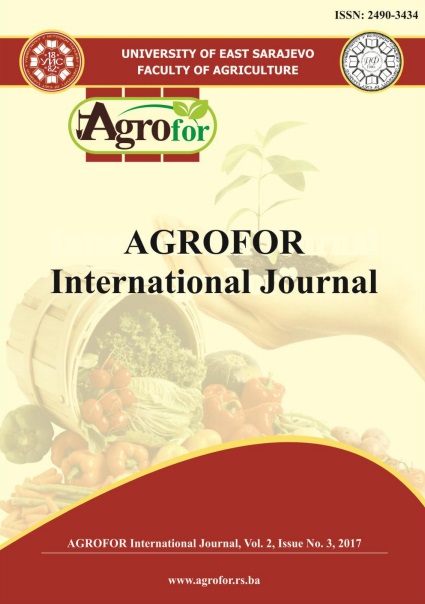BIOFERTILIZER BASED ON SILICATE SOLUBILIZING BACTERIA IMPROVES PHOTOSYNTHETIC FUNCTION OF BRASSICA JUNCEA
DOI:
https://doi.org/10.7251/AGRENG1703013MAbstract
Usage of biofertilizers is one of the important components of integrated nutrient
management, as they are renewable source of plant nutrients, ecologically safe
compared to chemical fertilizers and cost effective. Silicate solubilizing bacteria
(SSB) can play an efficient role not only in solubilizing insoluble forms of silicates
but also potassium and phosphates, hence increasing soil fertility and thereby
enhancing plant productivity. The aim of this study was to investigate the influence
of SSB-enriched biofertilizer on the structural and functional parameters of
photosynthetic apparatus of Brassica juncea (L.) Czern. The pure culture of SSB
was isolated from the clay substrate, cultivated on Zak–Alexandrov medium and
identified as Bacillus sp. To obtain the biofertilizer, SSB culture (0.6*108 cfu mL-1)
was mixed with steriled peat (1:1, v/w) and dried at 35–40°C. Plants were grown
from seeds during two months in the pots with adding SSB-enriched biofertilizer to
the mixture of clay and soil (1:10, w/w). The clay substrate plus peat without SSB
was used as a control. It was found that addition of SSB-enriched biofertilizer to
clay substrate significantly increased the content of total nitrogen, phosphorus and
potassium in the leaves of B. juncea. The thickness of mesophyllic layer and the
number of mesophyll cells were increased on average by 24 %. It was correlated
with a sharp increase of photosynthetic pigment content and CO2 uptake (1.5–2.0
times). We can conclude that SSB-enriched biofertilizer improves the
photosynthetic function of B. juncea.

